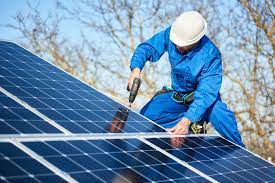There are a few key tips for getting the most out of your solar power system. These include getting a good quality installation, understanding your energy usage and monitoring.
Keeping your panels clean is important to improve solar electricity generation. A quick spray with the garden hose can help.
You can monitor your solar system through the app that came with your inverter, or you can purchase a consumption monitor.
1. Keep your roof clean
Your solar panels are constantly exposed to the elements, from heat and sunlight to dust, bird droppings, pollen, leaves and other debris. Over time, this can cause your system to produce less electricity than it should. Fortunately, regular cleaning can help your system perform better and increase its efficiency.
Researchers at Google’s solar farm found that a good cleaning can double your panel’s energy production. If your roof is safe to access, a gentle brush and a hose can be all you need. Just remember to check with your panel manufacturer and follow proper safety precautions.
If your panels are not easily accessible, or if you prefer to hire someone else for the job, some local solar energy pros offer cleaning services. They can also provide you with performance monitoring so you can keep track of your home’s solar energy output.
2. Install a battery
Adding a battery to a solar power system can increase savings and make your energy independence much greater. However, it’s important to properly size the batteries based on your electricity use and energy storage objectives. A professional installer will be able to help you determine the best option for your home.
A battery can be a great way to offset TOU rates and demand charges, which are fees levied on residential customers based on their electricity consumption during peak times (typically in the afternoon and evening). A battery can also reduce grid electricity consumption by drawing from its stored energy when utilities charge expensive peak rates.
If your solar panel system was designed with the intention of incorporating storage, adding a battery should be relatively straightforward. But, if the solar system wasn’t designed to incorporate storage, the process may require an inverter replacement and AC coupling to a critical load panel that will receive power from the battery.
3. Keep your panels out of the shade
During the standard 25-year lifespan of solar panels, a lot can happen: trees may grow taller and neighbouring buildings might appear. If the shade from these new structures is constantly falling on one or more of your solar panels, their output will plummet.
Luckily, manufacturers are working on solutions to this issue. For example, amorphous and thin-film silicon solar cells are better at resisting shading than crystalline solar cells. Moreover, microinverters and DC optimisers can help reduce the impact of shading on your system.
You can also monitor your solar panel array and its performance via smartphone apps. This way, you will know when something’s blocking your panels and take preventive measures to remedy the problem. Alternatively, ask your installer to use a range of mapping tools to see whether any nearby objects will cast a shadow on the area where you want to mount your solar panels. Then, you can choose a location that won’t be affected by shading.
4. Don’t forget about the lights
Many solar lights have a light sensor that detects when it’s dark outside and turns the lights on. If there are other light sources nearby, such as a streetlight or the moon, the light sensor may think it’s daytime and turn off the lights. To avoid this, you should make sure your solar lights are installed away from other light sources.
It’s also important to remember that a solar power system is only as good as the electricity it produces. That’s why it’s critical to have a performance monitoring system in place. A good monitoring system will provide you with detailed information about how much electricity your solar panels are producing on a daily basis. With this information, you can identify any problem areas and make necessary adjustments. This will ensure that your solar power system is delivering the best possible results. Interested in learning more? Contact Aurora Solar today to schedule a free solar consultation.

